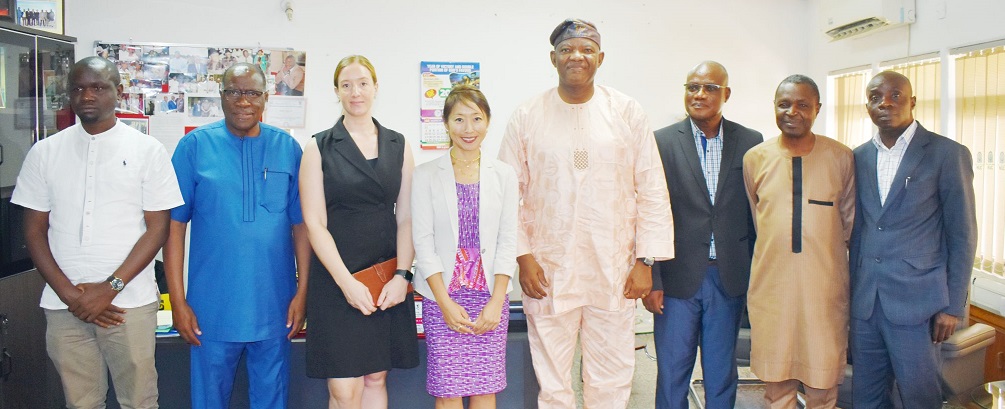
A delegation from the African Development Bank (AFDB) group , led by its Chief Education Analyst, Dr. Keiko Takei, which also had a Professor from the University of Ibadan last Friday visited the National Universities Commission (NUC) and were received by the Deputy Executive Secretary DES, Academics, Dr. Noel Biodun Saliu. The visit was sequel the planned kick-starting of the second phase of the Pan-African University Project at the University of Ibadan.
Receiving the team, the Deputy Executive Secretary, Academics described the PAU Project as a novel one, which had already impacted the Universities that benefited during the first phase and urged the University of Ibadan to make meaningful use of the project to improve on their existing research capabilities.
He expressed confidence that the Project which had helped to reshape and redefine some African institution’s capacities to compete favourably with their counterparts at the global arena would, no doubt, be a value-addition to the University of Ibadan and others benefiting from the phase 2 programme.
In his brief remark, the leader of the delegation, Dr. Takei thanked Dr Saliu for the opportunity to interact with the NUC on what the AFDB had been doing not only in Nigeria, but the entire African universities landscape.
It is noteworthy that the Pan-African University Project remained a beacon of support for Higher Education Institutions (HEIs) across the continent, aligning with Africa’s overarching goal of enhancing its global competitiveness and expediting growth.
By fostering the establishment of top-tier academic institutions and nurturing advanced research capabilities, this initiative was poised to redefine the landscape of higher education in Africa.
Central to the AFDB’s mission was the facilitation of mobility among African researchers, educators, and scholars. Through collaborative exchange programmes and robust engagements with peers from both African and international institutions, the project endeavours to cultivate a dynamic ecosystem of knowledge-sharing and innovation.
In addition, the Pan-African University Project was meant to ensure accessibility to education by instituting a fellowship programme, providing vital financial assistance to all enrolled students during its initial five years.
This crucial endeavour, not only expanded educational opportunities but also served as a catalyst for socioeconomic development across the continent.Undoubtedly, the impact of this project extended far beyond academia, as it played a pivotal role in shaping the next generation of African leaders and innovators.
Dr. Takei highlighted that by nurturing high-level human capital, the Pan-African University Project remained an indispensable agent of transformation, driving Africa towards a future defined by prosperity and excellence.
In the AFDB delegation were its Consultant on the Project, Michel Corbin Guedegbe; Innovation Technology Coordinator, Henriette Christensen; Social Development Coordinator, Gregory Osubor; AFDB Consultant 2 and Professor from Technical University of Kenya, Jason Mochache and Climate Change Coordinator, Gerald Njume.
